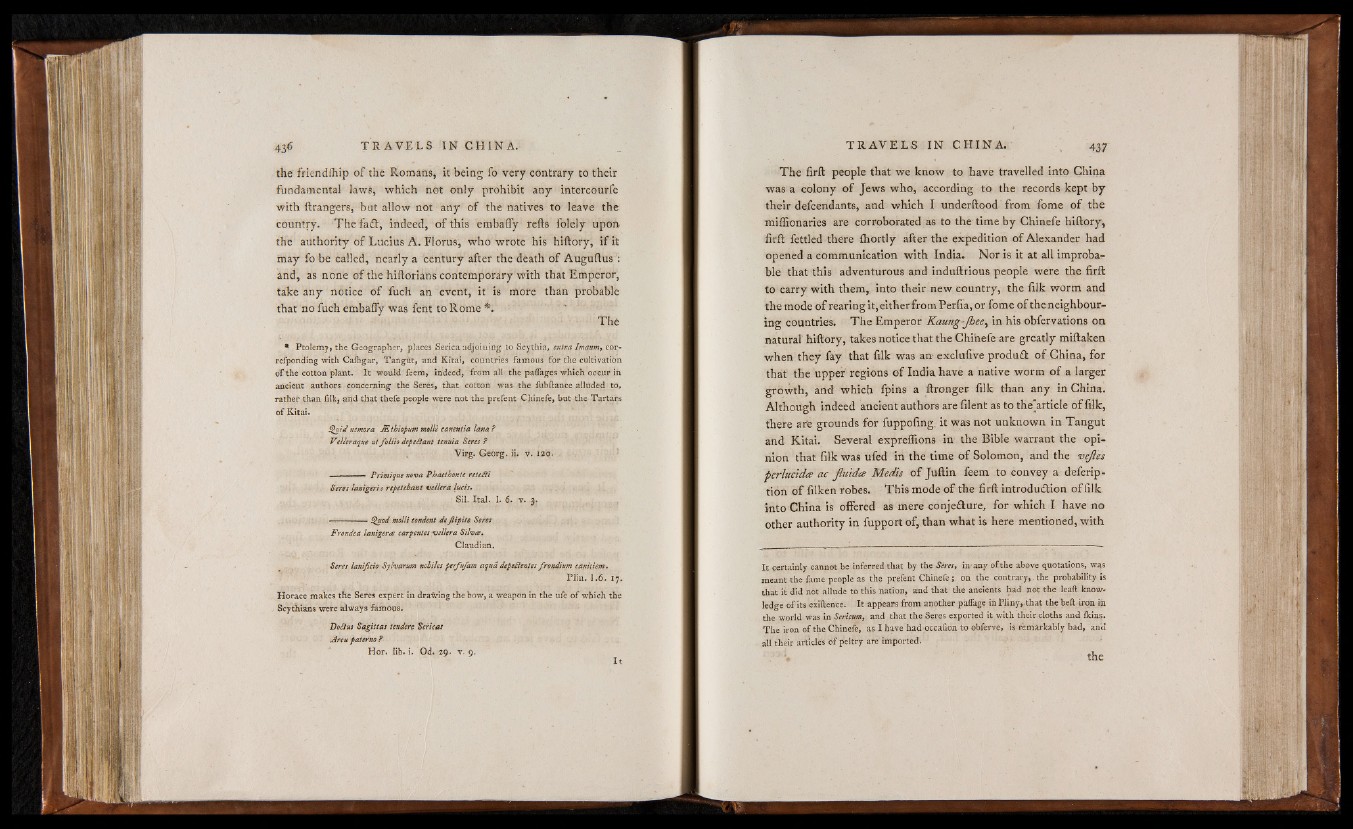
the friendihlp o f the Romans, it being fo very contrary to their
fundamental laws, which not only prohibit any intercourfe
with ftrangers, but allow not any o f the natives to leave the
country. The fa il, indeed, o f this embaffy refts folely upon
the authority o f Lucius A . Floras, who wrote his hiftory, if it
may fo be called, nearly a century after the death o f Augufius :
and, as none o f the .hiftorians contemporary with that Emperor,
take any notice o f fuch an event, it is more than probable
that no fuch embafly was fent to Rome *.
The
* Ptolemy, the Geographer, places Serica adjoining to Scythia, extra Imaarn, cor-
refponding with Caihgar, Tangut, and Kitai, countries famous for the cultivation
of the cotton plant. It would feem, indeed, from all the paflages which occur in
ancient authors concerning the Seres, that cotton was the iubitance alluded to,
rather than filk, and that thefe people were not the prefent Chinefe, but the Tartars
o f Kitai.
£)uid nemora JEthiopum molli canentia lana ?
VeJleraque ut jfoltis■ depeffant tenuia Seres ?
Virg. Georg, ii. v. 120.
-.1 ' Primique nova Pbaetbonte ret edit
Seres lanigeris repetebant vellera lucis.
Sil. Ital. 1, 6. v. jj.
—:— ■— j— Quod molli tondent de Jlipite, Seres
Fronde a lanigera carpentes vellera Silva.
Claudian.
Seres lanijicio Sylvarum nobiles perfufam aqua depeffentes frondium canitiem.
Plin. 1.6 . 17.
Horace makes the Seres expert in drawing the bow, a Weapon in the ufe o f which the
; Scythians were always famous.
Doff us Sagittas tend ere $ericas
uircu paterno ?
Hor. lib. i. Od. 29. v. 9.
I t
The firft people that we know to have travelled into China
was a colony o f Jews who, according to the records kept by
their defcendants, and which I underftood from fome o f the
miffionaries are corroborated as to the time by Chinefe hiftory,
firft fettled there ihortly after the expedition o f Alexander had
opened a communication with India. Nor is it at all improbable
that this adventurous and induftrious people were the firft
to carry with them,, into their new country, the filk worm and
the mode o f rearing it, either from Perfia, or fome o f the neighbouring
countries. The Emperor Kaung-Jheet in his obfervations on
natural hiftory, takes notice that the Chi'nefe are greatly miftaken
when they fay that filk was an- exclufive produd o f China, for
that the upper regions o f India have a native worm o f a larger
growth, and which fpins a ftronger filk than any in China.
Although indeed ancient authors are filent as to the'article o f filk,
there ar'e grounds for fuppofing, it was not unknown in Tangut
and Kitai. Several expreifions in the Bible warrant the opinion
that filk was ufed in the time o f Solomon, and the vefles
perlucidce ac fluida; Medis o f Juftin feem to convey a deferip-
tion o f filken robes. This mode o f the firft introdudion o f filk
into China is offered as mere conjedure, for which I have no
other authority in fupport of, than what is here mentioned, w ith
It ceitainly cannot be inferred that by the Seres t in any o f the above quotations, was
meant the fame people as the prefent Chinefe; on the contrary,. the probability is
that it did not allude to this nation, and that the ancients had not the leaft knowledge
oflts exiftence; It appears from another paflage in Pliny,.that the beft iron in
the world was in Sericum, and that the Seres exported it with their cloths and ikins.
The iron of the Chinefe, as I have had occaiion to obferve, is remarkably bad, and
all their articles o f peltry are imported.
v the